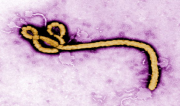Article
WHO Reports on Ebola Conditions in Liberia
Author(s):
The Ebola outbreak in West Africa is showing no signs of slowing down. As more people become infected and die from the virus, the World Health Organization (WHO) is looking for international help to bring the medical emergency under control.

The Ebola outbreak in West Africa is showing no signs of slowing down. As more people become infected and die from the virus, the World Health Organization (WHO) is looking for international help to bring the medical emergency under control.
Part of that work includes sending what the WHO described as a “team of emergency experts” who met with the government of Liberia to see what could be done in to control Ebola in that country, which has been among the hardest hit by the outbreak.
A statement from the WHO said that during the meeting it was “agreed that the demands of the Ebola outbreak have completely outstripped the government’s and partners’ capacity to respond.” There have been confirmed Ebola cases in all but one of Liberia’s 15 counties, and 152 health care workers there have been infected with the virus, with 79 of those dying as a result.
The 152 health care workers infected is just a small fraction of the nearly 2,000 people believed to be infected in the country, resulting in more than 1,000 deaths. The fatality rate for Ebola cases in
Liberia is 58%, among the highest in the current outbreak as the death toll continues to rise.
The situation is particularly dire in Montserrado, which is also the county where Liberia’s capital Monrovia is located. The WHO estimated that in that one county alone there is a need for 1,000 beds, yet only 240 are available. They noted that there are plans to add another 260 beds, but even with that the demand will far exceed the supply.
A recently opened facility had room for 30 patients and was overrun when 70 infected people arrived for treatment. In order to treat that many people, the WHO estimated more than 200 additional health care professionals would be needed.
The WHO noted that even when Ebola patients are admitted for treatment to one of the country’s facilities, there is no assurance they will get the help they need.
“The fact that early symptoms of Ebola virus mimic those of many other common infectious diseases increases the likelihood that Ebola patients will be treated in the same ward as patients suffering from other infections, putting cases and medical staff alike at very high risk of exposure,” the WHO said. “When patients are turned away at Ebola treatment centers, they have no choice but to return to their communities and homes, where they inevitably infect others, perpetuating constantly higher flare-ups in the number of cases.”
Another unfortunate byproduct of the outbreak, the WHO reported, is the increasing likelihood of children being orphaned as their parents die from the virus. This is another area the organization said it has been focusing its efforts, as is “helping recovered patients who have been rejected by their families or neighbours.”
The fact-finding trip to Liberia revealed three key areas that need to be addressed in order to stem the tide of the outbreak. That includes recognizing that “conventional Ebola control interventions” are not working the way they are intended to even as they prove effective in other countries.
As a result, the WHO said “far greater community engagement is the cornerstone of a more effective response. Where communities take charge, especially in rural areas, and put in place their own solutions and protective measures, Ebola transmission has slowed considerably.”
They also said in addition to local efforts being increased, “key development partners who are supporting the response in Liberia and elsewhere need to prepare to scale up their current efforts by three- to four-fold.”


